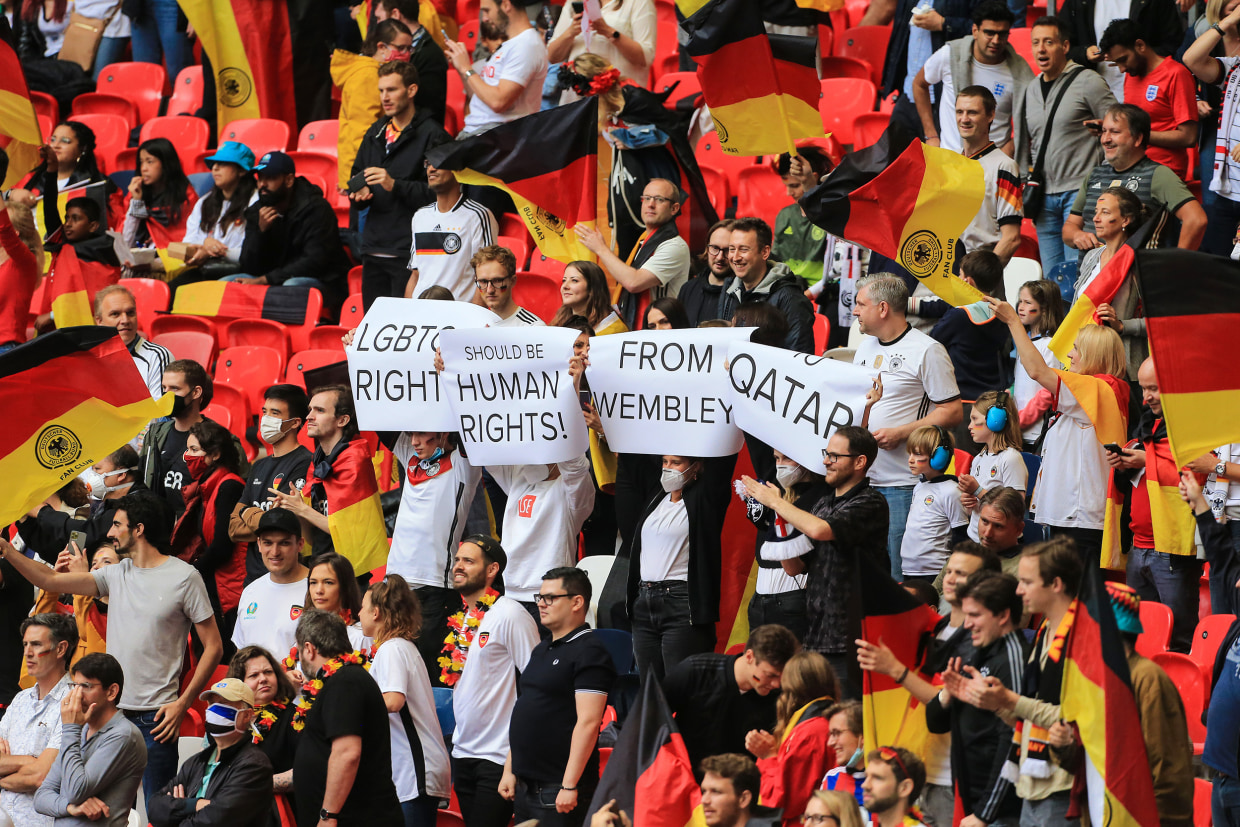No kissing in Qatar? Fears grow of crackdown on LGBTQ fans at World Cup
With the FIFA World Cup 2022 around the corner, concerns about how its host country, Qatar, will treat LGBTQ spectators have come to a head.

More than a million soccer fans from around the world are expected to gather in Qatar for next month's FIFA World Cup, but as the global competition nears, concerns over how the Gulf nation will treat its LGBTQ visitors are rising.
The Australian men’s soccer team released a video on Wednesday calling for Qatar to decriminalize same-sex relations and improve its treatment of migrant workers.
“These are the basic rights that should be afforded to all and will ensure continued progress in Qatar,” one of the players said. “This is how we can ensure a legacy that goes well beyond the final whistle of the 2022 FIFA World Cup.”
On Tuesday, British LGBTQ activist Peter Tatchell stood outside the National Museum of Qatar for 35 minutes holding a sign that read, “Qatar arrests and subjects LGBTs to conversion” and wearing a T-shirt that read, “#QatarAntiGay.” Tatchell, who was a leading member of the Gay Liberation Front in the United Kingdom, said he was held by Qatari police officers for 49 minutes before being told to leave the country immediately. Qatar’s Government Communications Office denied that Tatchell was arrested or detained, saying in a statement that Tatchell was “cordially” asked by officers to leave.
In a sign of solidarity with the LGBTQ community — and a breach of FIFA uniform rules — eight of Europe's soccer teams joined forces last month and announced that their teams would wear armbands emblazoned with rainbow hearts and "1 love" at the international competition.
Qatar, the first Middle Eastern country to host the World Cup, is one of 11 countries — including Saudi Arabia, Afghanistan and Iran — where homosexuality could be punishable by death, according to Human Dignity Trust, a global advocacy group for LGBTQ rights. However, in its 2019 State Sponsored Homophobia report, the International Lesbian, Gay, Bisexual, Trans and Intersex Association (ILGA) noted that while it “technically it is possible that Muslim men could be put to death for same-sex sexual behaviours” in the country’s Sharia courts, “it does not appear that any person has been executed for this reason.”
For months, human rights activists and athletes have criticized the global soccer federation FIFA for hosting its premiere international competition, which begins Nov. 20, in the conservative Muslim nation due to its treatment of LGBTQ people, women and migrant workers.
In a statement shared with NBC News, a FIFA spokesperson said, “FIFA is confident that all necessary measures will be in place for LGBTIQ+ fans and allies to enjoy the tournament in a welcoming and safe environment, just as for everyone else.”
On Friday, an official from Qatar’s Government Communications Office told NBC News that "fans will be free to express themselves during the World Cup" but will be asked to "respect the local values and culture."
"As in many other countries in our region, overt public displays of affection, including for heterosexuals, are not part of the culture," the official said in an email. "That said, as a society we value privacy and respect, and these values are extended to everyone."
In a Wednesday interview with British broadcaster Times Radio, Qatar’s ambassador to the U.K., Fahad bin Mohammed Al-Attiyah, did little to quell concerns. When asked if same-sex couples would be permitted to hold hands or kiss in public, the ambassador replied: "There are certain interpretations of what would be a public display of affection in a particular country that might be different in another, so I think one has to just be mindful of the norms and cultures of Qatari society in that respect.”
The ambassador added that same-sex couples will not be stopped from sharing hotel rooms.
Addressing the fears on Wednesday, British Foreign Secretary James Cleverly wasn't any more reassuring, telling LBC Radio that Qatar "will try — they are trying — to ensure that people can be themselves and enjoy the football and I think with a little bit of flex and compromise at both ends, it can be a safe, secure and exciting World Cup."
Kristian Coates Ulrichsen, a fellow for the Middle East at Rice University’s Baker Institute for Public Policy, said the Qatari government would be wise to "turn a blind eye" to LGBTQ people or couples visiting. The risk of negative international attention would overshadow the success of hosting the internationally revered sporting competition, he said.
"It's been a key element of their development plans for more than a decade and part of Qatar's way of announcing itself as a state of ambition and as a state that has significant plans to play a greater role in international affairs," Ulrichsen said, referring to the World Cup.
Scrutiny over how Qatar treats its own LGBTQ people has also gained traction in the lead-up to the World Cup.
On Monday, Human Rights Watch released a report detailing six alleged cases of severe and repeated beatings and five alleged cases of sexual harassment of LGBTQ people in Qatari police custody between 2019 and this past September. The Qatari government denied the allegations made in the report.
Rasha Younes, a researcher who studies LGBTQ rights in the Middle East and North Africa for Human Rights Watch and author of the new report, said she hopes that the displays of LGBTQ solidarity will influence Qatar's domestic policies.
"We are not just concerned with what will happen during the World Cup, but also to continue monitoring the situation after the international fans have gone, after the media attention has dissipated, to really show a commitment to LGBTQ residents of Qatar who are now speaking out for the first time and raising the alarm about the abuses they have faced by security forces," she said.







